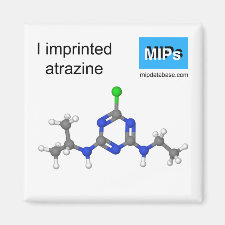
Authors: Lara FJ, Lynen F, Sandra P, García-Campaña AM, Alés-Barrero F
Article Title: Evaluation of a molecularly imprinted polymer as in-line concentrator in capillary electrophoresis.
Publication date: 2008
Journal: Electrophoresis
Volume: 29
Issue: (18)
Page numbers: 3834-3841.
DOI: 10.1002/elps.200700889
Abstract: Molecularly imprinted polymers (MIPs) have been evaluated as sorbent for the construction of an in-line solid phase extraction concentrator in capillary electrophoresis to be applied in the monitoring of triazine herbicides: atrazine and its three metabolites, desethylatrazine, desisopropylatrazine and desethyldesisopropylatrazine. Initially, the electrophoretic separation of these compounds was optimized. The electrolyte consists of an aqueous solution of 75 mM phosphoric acid (H3PO4) adjusted to pH 2.1 and containing 0.7 mM cetyltrimethylammonium bromide. After the fabrication and assembly of the concentrator into the capillary, these optimal CE conditions were applied to evaluate the performance of this device. Efficiencies of 40 000-55 000 plates could be achieved and the separation time was around one hour. Different parameters affecting the in-line molecularly imprinted solid-phase extraction in capillary electrophoresis such as composition and volume of the elution plug were optimized. The method was evaluated in terms of linearity, precision and limits of detection and quantification. MIPs were compared with Oasis® hydrophilic-lipophilic-balance (HLB) particles for the in-line coupling of solid-phase extraction and capillary electrophoresis. The superior selectivity of MIPs is demonstrated through direct injection of a urine sample spiked with 10 mug/mL atrazine, desethylatrazine, desisopropylatrazine and desethyldesisopropylatrazine. Recoveries were between 92 and 102% compared with an aqueous solution
Template and target information: triazine herbicides, atrazine, desethylatrazine, desisopropylatrazine, desethyldesisopropylatrazine
Author keywords: Atrazine and metabolites, capillary electrophoresis, In-line concentrator, Molecularly imprinted polymers, urine samples



Join the Society for Molecular Imprinting

New items RSS feed
Sign-up for e-mail updates:
Choose between receiving an occasional newsletter or more frequent e-mail alerts.
Click here to go to the sign-up page.
Is your name elemental or peptidic? Enter your name and find out by clicking either of the buttons below!
Other products you may like:
 MIPdatabase
MIPdatabase









